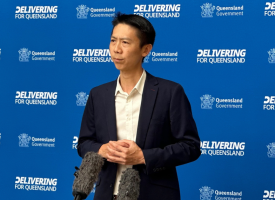Fluoride debate furthering regional health inequities
The lack of fluoridated water supply in regional and rural communities is furthering the health divide between metropolitan and regional areas, AMA Queensland President Dr Nick Yim told 4BC Radio. "Before 2012, 90 per cent of Queensland had fluoride in its water supply. Since the state government legislated it to be a local government responsibility, Queensland unfortunately has dropped to 70 per cent."

Transcript: AMA Queensland President, Dr Nick Yim, 4BC, Afternoons with Dean Miller, Friday 13 December 2024
Subject: Water fluoridation
DEAN MILLER: There's a push coming from the Australian Medical Association of Queensland calling for water fluoridation to be mandated across the state. It comes after six Cairns councillors voted against its reintroduction in the local water supply.
You see, fluoride was everywhere a while ago, but it's not these days. AMA Queensland’s push has been in conjunction with the Australian Dental Association of Queensland. The problem is dental decay – one of the most preventable diseases. Research has shown that here in Queensland, one in 10 people do not have enough teeth to chew their food. Do you believe that? It's staggering, isn't it? People get a little bit scared, though, when they hear about chemicals being added to our water supply. Now the tinfoil hats come out, all that sort of stuff goes on.
We're going to try and put all of that behind us today here on 4BC Afternoons. I've got AMA Queensland President Dr Nick Yim with us. Nick, for those worried about fluoride in our water, what should they know? It's already there in Brisbane, isn't it?
DR NICK YIM: Good afternoon, Dean. You're right, it's actually been in Australia for many years and the research is undisputable. Over 70 years of research. There are no serious side effects that we've noted across those many years of research. It's very safe and effective at preventing dental decay.
DEAN MILLER: It's an interesting thing, fluoride, because there are a lot of people who disagree with it for a myriad of reasons. Tell me a bit about how much is added and why it's so important to our teeth?
DR NICK YIM: So how much is added? It's a tiny amount. It's one part per million. That's between 0.6 to 0.8mg/L and has been proven to be safe since the 1940s. The main reason why – full addition has been shown to prevent dental decay, especially in children. We know that if people have dental decay, that can lead to dental infections, and that can lead to chronic pain and lost time from school and work.
DEAN MILLER: Are there some case studies that show, quite clearly, kids that have grown up without fluoride in their water versus kids that have, and are we able to see those?
DR NICK YIM: Absolutely. There are some studies that do suggest that for people without fluoride, there's a 30 per cent chance of increased rate of dental infections. Fluoridation, it occurs worldwide, as you've noted. To give you an idea, before 2012, 90 per cent of Queensland had fluoride in its water supply. Since the state government legislated it to be a local government responsibility, Queensland unfortunately has dropped to 70 per cent. The areas that don't have fluoridation in waters, unfortunately, are in regional and rural Queensland. This is having that greater divide between the metropolitan and regional areas.
DEAN MILLER: You'd expect that local councillors would be fairly learned, but it seems that in Cairns, six councillors have voted against the reintroduction of fluoride to their local water supply. What would you put that down to?
DR NICK YIM: I'm not too sure. It is disappointing, the scientific evidence is undeniable. This is something that's not just the Australian Medical Association, it's also the Australian Dental Association. So, both groups, dentists and medical practitioners, we are seeing unfortunately a rise of dental infections, pain and lost time from school and work, which is quite concerning.
DEAN MILLER: What other councils don't have fluoride in their water around Queensland that you know of?
DR NICK YIM: I'm aware that the Fraser Coast Council doesn't have fluoride and some other regional areas. I think the key message here is that we do need to look at the scientific evidence, which is evidence based, and listen to the experts. This is the reason why we have research available to show and demonstrate the effectiveness of fluoridation.
DEAN MILLER: Are there any health risks that might come from consuming fluoride? Can you have too much in the water supply?
DR NICK YIM: There are some risks if there's significant amounts of fluoride. There could be some staining of the teeth. But this is the reason why they do have the water tested to ensure that it's in a very low amount and it's at very safe levels.
DEAN MILLER: What about when you live in an environment with no fluoridation? Is there a toothpaste you can use, or is there a type of medication that you can take to ensure that you're getting an adequate amount of fluoride into your system?
DR NICK YIM: There are some other measures, but it's not as effective as a water supply with fluoridation. We do continue encouraging people to have their regular dental check-ups, brushing their teeth, but it is undeniable that fluoridation does assist preventing dental disease, especially in that early childhood area.
DEAN MILLER: Water fluoridation was mandated back in the day, like way before it being revoked under the Campbell Newman Government. We've now got an LNP government back in power. Do you see much support coming from David Crisafulli and his mob?
DR NICK YIM: I think the key thing is, AMA Queensland, we always have a great working relationship with Queensland Health and the Queensland Government. I think we do need to look at the data and the undeniable evidence and what we are seeing. Unfortunately, what I'm hearing from my emergency colleagues, there are more presentations to EDs with dental pain, dental infections. As you can imagine, that's putting additional strain on the healthcare system.
DEAN MILLER: Just finally mate, the cost to fluoridate water would be cost prohibitive for some of those smaller councils I might suggest. Is there a long-term net benefit to doing it though, when you think of the money that they'll save for their constituents through less dental decay?
DR NICK YIM: We all know that when we visit the dentist, maybe have a tooth extracted, maybe needing crowns, that can be quite costly for that individual. We're also not taking account of the time lost from school, time off work, etc. This is something where prevention is better than cure, and this is where early investment is key.
DEAN MILLER: And of course, we open the discussion with this staggering piece of information that dental decay being one of the most preventable diseases. Research has shown that here in Queensland, 1 in 10 people don't have enough teeth to chew their food. So, what are they eating, soft foods? Foregoing things like steak and those types of things because they can't actually masticate them.
DR NICK YIM: I know for myself, I enjoy my food, I enjoy a steak, I enjoy having those crunchy vegetables. But we are seeing unfortunately people needing their tooth extracted, people having chronic pain and at the same time maybe needing to use dentures, for example. So, if we can prevent all that from occurring, that'll be great for Queenslanders.
DEAN MILLER: I'll tell you what. Whenever you talk fluoridation of water on 4BC, we get calls. So I'm really looking forward to getting some calls this afternoon. I think you've stated the case beautifully as you say, history condones the use of fluoride in water. I would think in the majority of cases, right through the country, it's been the right way to go and has continued to be for many years. I am just surprised, though, that it's left to local councils to have an opinion on this. I would have thought it was a medical question and not something for local council. Is there any way that the state government can just get involved and mandate it across the state?
DR NICK YIM: I think you're right there. I think it's one of those things that does frustrate medical practitioners and dentists. We do have something that's relatively simple, and I think we need to put politics aside and look at public health as a key thing here.
DEAN MILLER: Very interesting. Water fluoridation, how do you feel about it? Thank you very much for your time on this Friday afternoon, Dr Nick Yim, the President of AMA Queensland.



